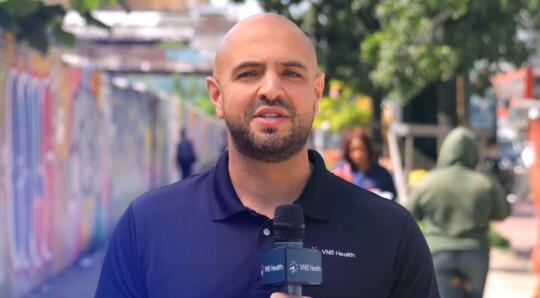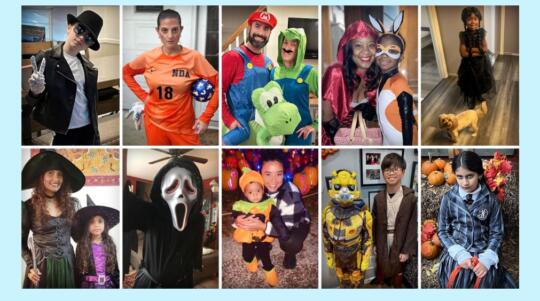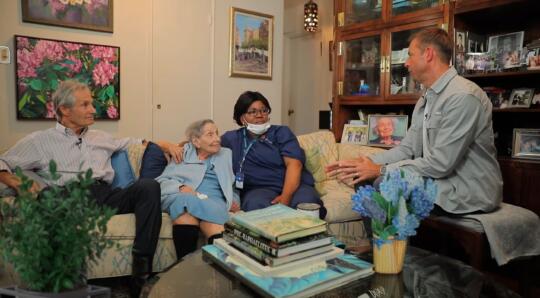COVID-19 Vaccine FAQs #1: December 15, 2020 — How the Vaccine Works and Why You Should Get It

For Spanish, click here.
For Chinese, click here.
Now that that Moderna COVID-19 vaccine has received emergency use authorization from the FDA, VNSNY expects to receive its first delivery of the vaccine in the very near future. It will be offered first to our frontline staff on a voluntary basis, and eventually all VNSNY staff will be able to get the vaccine if they wish. We hope that staff members will choose to get the vaccine, but we understand that people have questions and concerns. To help you make your decision, here are some important things to know about the Moderna vaccine and COVID-19 vaccines in general.
Vaccine Availability & Administration
1. Why should I get vaccinated against COVID-19?
COVID-19 vaccines are a proven and safe way to help protect you from getting sick if you’re exposed to COVID-19. The vaccines also significantly reduce the seriousness of COVID-19 in the unlikely event that you do become sick after being vaccinated (which is a less than 5% chance). The CDC recommends COVID-19 vaccination as the first and best way to protect against COVID-19.
2. When will we be getting the vaccine?
The FDA authorized the Moderna vaccine for emergency use on December 18, 2020. We expect to receive our first shipment of the vaccine early in the week of December 20 and will begin vaccinating staff very soon after that. We will keep you posted on the exact timing.
3. Why are VNSNY frontline staff among the first to get the vaccine?
Federal and state recommendations call for frontline healthcare workers to be vaccinated first, since they are at substantial risk of being exposed to the coronavirus through encounters with patients and are also essential to the management of the COVID-19 pandemic.
4. Are staff members required to get the COVID-19 vaccine?
The Moderna COVID-19 vaccine is being offered to VNSNY staff on a voluntary basis. However, we strongly encourage you to get vaccinated to protect yourself against possible illness from COVID-19 infection.
5. Do I have to pay for my COVID-19 vaccine?
No. The vaccine is provided to VNSNY staff at no cost.
How the Moderna Vaccine Works
6. Why is VNSNY using the Moderna vaccine?
The Moderna and Pfizer vaccines are very much alike, and their safety and efficacy data is similar. The main reason VNSNY is using the Moderna vaccine is because it’s easier for us to store, transport and distribute. The Pfizer vaccine has to be stored in a “deep freeze” of -94°F—a temperature requiring specialized freezers—until ready for use. It can then last in a normal refrigerator for five days after it thaws. The frozen Moderna vaccine can be stored at -4°F, a temperature that regular industrial or household freezers can achieve. Once thawed, it can be kept in a normal refrigerator for up to 30 days.
7. How does the Moderna COVID-19 vaccine work?
The COVID-19 vaccine made by Moderna—like the one made by Pfizer—is a “messenger RNA,” or “mRNA,” vaccine. These vaccines are relatively new, and they work differently from other vaccines. Many vaccines contain a virus or virus fragment that has been weakened or inactivated, so it can’t make you ill. When the vaccine is injected, the virus triggers an immune response, producing antibodies and other immune cells that protect you from that same virus in the future. Instead of a virus, however, mRNA COVID-19 vaccines contain a piece of genetic code that instructs your cells to produce a protein resembling the “spike” on the outside of the COVID-19 coronavirus. Although this spike-shaped protein is harmless, your body recognizes it as foreign—causing your immune system to attack it. If you get the vaccine and then you’re exposed later to the COVID-19 coronavirus, this immune response will recognize the spikes on the coronavirus and attack the virus, enabling your body to fight it off and avoid serious illness.
8. How is the Moderna COVID-19 vaccine administered?
The Moderna COVID-19 vaccine is given by intramuscular injection, meaning it’s injected into the muscle of the shoulder, similar to the flu vaccine. It requires two doses. The second dose of the vaccine has to be administered 28 days after the first, in the same way.
9. Why do I need to get two vaccine shots?
The two-dose regimen is important to ensure you develop the highest level of immunity provided by the vaccine. In the case of the Pfizer vaccine, effectiveness after just one dose of the vaccine is around 50%, compared to the 95% achieved after two doses. Two-dose vaccines typically also tend to offer longer-lasting immunity. For these reasons, it is highly recommended that you complete the full course of vaccination doses.
10. What if I’m late getting my second shot of the vaccine?
According to experts, getting the second shot of the COVID-19 vaccine a day or two late will not compromise the effectiveness of the vaccine, and is preferable to getting only one dose. However, you should follow the vaccination schedule—28 days between doses—as closely as you can.
11. What if I’ve already had COVID-19, or I’ve tested positive for the antibodies—should I still get the vaccine?
Yes. At this time, we don’t know how long naturally acquired immunity to COVID-19 will last, and there have been cases of patients being reinfected. Getting the Moderna vaccine may provide stronger immunity than the natural immunity you developed after infection, so it’s safer to get the vaccine than to rely on your prior antibodies. A history of COVID-19 or positive antibody tests will not change how the vaccine affects you, or the possibility of side effects. However, those who have recently had COVID-19 should delay vaccination until 90 days after your diagnosis.
12. Should I get vaccinated if I’m in quarantine because I was exposed to COVID-19?
No. If you’re in quarantine after having been exposed to someone who has COVID, you should wait until your quarantine period ends before receiving the COVID-19 vaccine.
Vaccine Basics & Safety
13. How effective is the Moderna vaccine?
Preliminary trial results show that the Moderna and Pfizer vaccines are both about 95% effective in preventing illness after exposure to COVID-19. And in those few cases where someone was infected with COVID-19 after being vaccinated, not one person receiving the Moderna vaccine developed a severe case of COVID-19, and only one severe case was seen in those who received the Pfizer vaccine.
14. Can I get COVID-19 from someone else after receiving the Moderna vaccine?
It’s possible, but much less likely than if you didn’t get vaccinated. In preliminary trials, Moderna’s COVID-19 vaccine was 94.5% effective, which means it reduces your chances of becoming ill following exposure to COVID-19 by 94.5%. Data from the Moderna vaccine trial also indicates that even if you do develop COVID-19 symptoms after being vaccinated, you’re less likely to get severely ill as a result.
15. Is the Moderna vaccine safe?
Yes. Extensive clinical trials were done with thousands of participants for the FDA to study the Moderna vaccine’s safety and effectiveness. These results are then evaluated by regulatory agencies and independent scientific experts that follow very strict guidelines about deciding if a vaccine is safe. The full safety and efficacy data of the Moderna vaccine has been thoroughly evaluated by the FDA and CDC. These expert panels must review and approve each vaccine before it is released for use. When the FDA approved the Moderna vaccine, they noted that no serious safety concerns have been reported to date in the clinical trials. Intensive safety monitoring will continue after the vaccines begin to be used.
16. What are some of the side effects of the Moderna vaccine?
Clinical trials data from tens of thousands of people show that the Moderna vaccine’s side effects are mostly infrequent, minor and short-lasting. Just 10 to 15% of subjects reported more serious side effects—primarily pain at the injection site, muscle aches, fever and headaches.
17. I heard that some people had allergic reactions to the Pfizer vaccine. Should I be worried about that?
Severe allergic reactions to vaccines have become rare because problems like egg allergies are no longer relevant, since the vaccines are produced without the use of substances that are known triggers of allergic reactions. However, anyone with a history of severe allergic reactions like anaphylaxis should consult their physician about COVID-19 vaccination.
18. Can the Moderna vaccine give me COVID-19?
No. Because the Moderna and Pfizer vaccines are both mRNA vaccines, they do not contain any part of the virus that causes COVID-19. So it’s impossible to get COVID-19 from the Moderna or Pfizer vaccines.
19. How long is the Moderna vaccine effective? Will I have to get it once a year, like the flu shot?
At this time, it’s not clear how long you will be immune against COVID-19 after getting the Moderna vaccine. Currently, though, experts don’t think people will need to get the vaccine annually. Flu viruses mutate quickly and frequently, which is why our immunity to them is typically short-lived. The coronavirus that causes COVID-19 is not mutating as quickly, so frequent re-vaccination shouldn’t be required. Estimates from animal studies suggest the vaccine may provide protection for several years.
20. Can I still infect other people with COVID-19 after I’ve been vaccinated?
Scientists are still unclear about this—but it’s possible. We know that the COVID-19 vaccination will allow your body to quickly fight off the virus, preventing you from getting ill. In theory, however, a person who is immune to COVID-19 could still contain and spread the coronavirus despite not having any symptoms of illness.
21. After vaccination, can I stop wearing a mask?
No, you should still wear your mask after you get vaccinated. Even if you’re immune to COVID-19, it may still be possible for you to be contagious. That’s why it’s important to continue wearing a mask and socially distance to protect others and yourself from infection.
The Vaccine Approval Process
22. Since the COVID-19 vaccines were developed so quickly, how can I be sure of their safety and efficacy?
These vaccines have been produced quickly because the scientific community prioritized their development after the new coronavirus was first identified in December 2019. There are many steps in the vaccine testing and approval process in the United States, all designed to make sure a vaccine is safe and effective, and none of these steps have been skipped with the Moderna vaccine or any of the other COVID-19 vaccines. The process to develop a vaccine is usually done in a series of steps, in which one step is completed before the next step begins. For example, clinical trials and the FDA approval process are usually completed before large quantities of a vaccine are produced. However, in order to quickly have a vaccine available, the COVID-19 vaccine development effort completed these processes at the same time. They began manufacturing vaccines while they were still running their Phase 3 clinical trials, before they knew if the vaccine was effective or not. If the vaccine turned out to be effective and the FDA approved them, the vaccines would then be ready to use immediately upon approval—which turned out to be the case with the Moderna and Pfizer vaccines.
23. What are the different steps in the vaccine testing and approval process?
The first step involves animal studies to determine the vaccine’s safety before moving on to human trials. Then, there are three human clinical trial phases, each with larger sample sizes. Phase 1 assesses the vaccine’s safety, Phase 2 evaluates the vaccine’s effectiveness and side effects, and Phase 3 tests whether the drug is safe and effective in a large group of people. The vaccine manufacturer can then apply for approval with the Food and Drug Administration (FDA) based on these clinical trial results, an evaluation process that typically takes 6–10 months.
24. Where is the Moderna vaccine in this process?
The FDA granted emergency use authorization (EUA) for the Moderna vaccine on December 18. In the EUA process, FDA approval is granted a bit earlier than usual to meet the demands of a public health crisis. However, an EUA can be offered only after substantial results have been reported from Phase 3 clinical trials. With the Moderna COVID-19 vaccine, over 30,000 subjects from across the United States are now participating in its Phase 3 trials. The research covers all age groups, and 37% of the trial volunteers come from racial and ethnic minority groups. While the Moderna vaccine, along with the Pfizer vaccine, is one of the first mRNA vaccines to become available to the public, it’s not the first mRNA vaccine ever developed. This method is already in use in several other vaccines currently in clinical trials, and researchers have been working with mRNA vaccines for decades.
25. Do scientists expect to learn more about the Moderna COVID-19 vaccine?
Absolutely. The good news is that the research on these vaccines doesn’t stop after they are approved for distribution. The vaccine’s phase 3 trials will continue after the FDA’s emergency use authorization, and researchers will continue to collect data on their safety and efficacy for years to come, so eventually we will know much more about how long their immunity lasts and other important facts.
26. If I have more questions about the vaccine, who should I contact?
Please email any questions you have about the COVID-19 vaccine to: [email protected]


